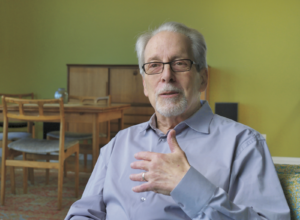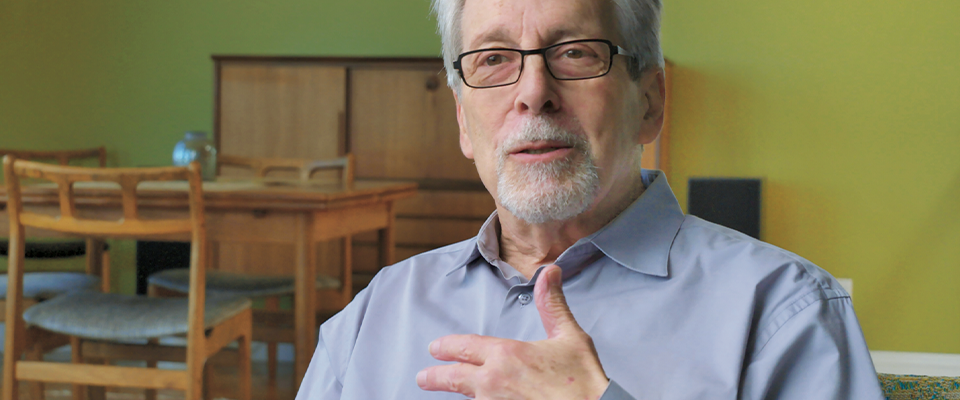Linguist Geoffrey Nunberg talks pronouns and our changing language.
“Letter-for-letter, no part of speech gets people more worked up than pronouns do,” Geoffrey Nunberg wrote last year in an op-ed for NPR. But this “pronoun rage,” which speaks to the growing agitation around gender and identity politics, isn’t all that new, he says. And he would know.

Nunberg, a professor at the UC Berkeley School of Information, is somewhat of a linguistics celebrity. A regular contributor to NPR’s Fresh Air, with numerous articles and books—including Talking Right and, most recently, Ascent of the A-Word—to his name, he teaches and writes about semantics and the structure of language, asking important questions like: How much does pronunciation really matter? Are emoticons (a word which he says “deserves to die horribly in a head-on collision with infotainment”) going to permanently alter our language? And what exactly is an asshole?
California magazine sat down with Nunberg in his San Francisco home to talk about gender-neutral pronouns, the word of the year, and what language has to do with the people—us—who use it.
This conversation has been edited for length and clarity. To hear more of this interview, check out our podcast, The Edge, coming in summer 2020, wherever you get your podcasts.
How does a new word or linguistic convention make its way into everyday speech?
Geoffrey Nunberg: Some words percolate up—most do, I think—whether it’s [from] adolescent slang or just ordinary usage. The classic instance was on fleek, which was used by one of these Vine stars. It spread instantly, and within two months it was old news. That’s the story with slang, very often. When we’re adolescents, we invent slang to distinguish us not just from our elders but from the seniors who graduated last year. And when they start using it, we have to find something else because the point of slang in a certain sense is to set off a group. Language has that function, both of joining people and excluding other people.
Other [words] enter from technical fields, from academic fields. The number of words that the social sciences contributed to the language in the 1950s and ’60s is enormous, whether it’s peer pressure, status-seeking, alienation, conformist, ethnic, identity politics, sociopath, or whatever. These are all words that came from social science. Now they come from informatics or from business, from commerce.
A lot of words are borrowed from foreign languages. The English language is bristling with words that originated overseas.
In communities like Berkeley, it has become almost the norm to ask someone’s pronouns. Can you talk about how the pronoun they (singular) worked its way into the common vernacular?
GN: They has a really interesting history. English has always had the problem of lacking a gender-neutral pronoun that can mean either he or she or anything else. So when you say, for example, “Was it Bill or Sally who left their coat?” or “his coat” or “her coat” or “his or her coat,” you have this his or her, which is awkward. The obvious thing to use there is the plural they as a singular. “Either Bill or Sally left their coat.” And people have been doing that since Shakespeare’s time. Jane Austen’s works are brimming with sentences like “Everybody took their leave.”
In the 19th century, grammarians decided that that must be incorrect because they is plural and that one must use the singular he, which they said had a generic meaning (as they put it, the masculine embraces the feminine) so that you must say “Everybody took his coat,” and to say anything else would be ungrammatical and incorrect. Now, that’s never been the case—he has never been generic. Sting did not sing, “If you love somebody set him free,” because that would imply that the person you love could only be a male. He had to say “set them free.”
Over the years, people kept proposing new gender-neutral pronouns. A. A. Milne, the author of Winnie the Pooh, was a great fan of gender-neutral pronouns, maybe because he would have preferred that all those characters in the stories be gender-neutral (certainly that the stuffed toys seem to be). And in the 1960s and ’70s, feminists began to object very strenuously to the idea of generic he and said instead that the pronoun they should be perfectly acceptable in these cases. The reaction to that, in retrospect, was extraordinary. People were yelling about “radical feminists”; the chair of the Harvard Linguistics Department said they were suffering from “pronoun envy.” But over the years, that use of they was increasingly acceptable, not just in speech where it’s always been acceptable, but in informal writing, magazine writing, and even to a certain extent in academic writing.
The fact is that they has always been a gender-neutral pronoun. You’re sitting at the dinner table and your daughter’s phone rings. And you say, “Tell them you’ll call them back.”
Why do you think they has had more success than other gender-neutral pronouns?
GN: Well, these other pronouns, ze and thon and so on, involve learning a whole new paradigm of pronouns. Pronouns are a very basic form of English speech and learned very early. So adopting a whole new set of pronouns would make things more difficult than merely extending a pronoun whose gender-neutral use goes back forever.
Does changing our use of pronouns actually change society?
GN: It changes the way people think about these categories. At first, it makes them conscious of the categories, that people are out there who are not cis male or cis female but have other gender identities, and that one should be mindful of that. In the same way that the rejection of generic he forced people to realize that women as well as men played various roles—or, [through] the adoption of all of these new job titles and job descriptions, that the person who brings your mail every morning isn’t necessarily a “postman.”
And from my own perspective, if I were a little girl, and there were only congressmen and firemen and policemen, I would automatically be excluded. So it also helps people imagine themselves in those roles.
GN: Yes, I think that’s a very good point. And it was one of the primary motivations for changing all of these job descriptions and titles and so on, beginning in the 1960s.
It makes me think about the Oscar nominations and having separate categories for Best Actor and Best Actress. What do we do when one of the best performing actors this year is non-binary?
GN: The Academy hasn’t yet had to wrestle with that, but my guess is that within the next three or four years that’s going to happen. And that will be a big deal, because people will start to realize that the actor/actress distinction is specious.
Could you envision a society in the relatively near future, perhaps an American society, where we don’t use gender-identifying pronouns anymore?
GN: It’s hard to imagine that he and she will drop from the language. When you’re speaking of cis females and cis males, they are anchored in historical usage, and asking the cis males and females to give up their pronouns in favor of they or something else—it’s a big ask. It’s not likely to happen. Now, if we were speakers of Chinese or Finnish, this wouldn’t come up because there’s only one pronoun. It wouldn’t occur to me that I should have a different pronoun than my wife or my daughter.

If, hypothetically, we were able to remove gendered pronouns, would that have an impact on how we view gender as humans?
GN: You mean if we turned English into Finnish, for example?
Or we could ask, do the Finns operate differently because they don’t have gendered pronouns?
GN: I don’t know that those experiments have been run, and I’m not sure that that’s the case—Finns are certainly capable of sexism. As are the Chinese. The other difference is that, for the moment, the singular they in those contexts where there’s a definite subject—“Sandy combed their hair”—has become, not exactly gender-neutral, but associated with gender non-conforming or non-binary gender. It’s not really gender-neutral because people are not going to say, “Geoff was combing their hair.” And I’m not going to think of myself that way. I’m not going to say, “My daughter was combing their hair.” Probably in a better world I would, but it’s not gonna happen.
That’s an interesting point that they is not a blank canvas. It means something in our society.
GN: It has encountered enormous resistance, less so in a place like Berkeley than in other parts of the world. The University of Tennessee at Knoxville published a guide to gender-neutral pronouns. The legislature got so worked up that they passed a law that abolished the Pride Center from which this had come and prohibited the university from ever teaching anything about gender-neutral pronouns.
To change topics: Every year you choose a word of the year for NPR. How do you do it?
GN: I tend to pick words that reflect sometimes political activity, sometimes social movements, sometimes economic movements. Nationalism I picked the year before this when Trump declared himself a nationalist. I picked gig a year or two before that because the gig economy was obviously a big story. And gig is an interesting word because it comes from a word that musicians used for a job. The first person to use it just for a [generic] job—“I have a gig running an elevator” or whatever—was Jack Kerouac, and I was so pleased with that discovery that I wanted to make it the word of the year.
Selfie I made a word of the year. Occupy obviously was the word of the year. Though, to be sure, I said when I made that the word of the year, “Occupy is the word of this year, but it’ll disappear. It’s not going to be around for a long time.” And it wasn’t. The words that will endure that entered general usage at that time were the 1% and the 99%. In fact, I think you could say the 1% is the word of the decade rather than they.
How do you know which words are going to stick around and which aren’t?
GN: I don’t know that I can give you a general rule for when a word is going to survive and when it won’t, but it has to answer to a serious need. And it can’t be too much associated with one specific group or it won’t spread to the general population.
On some level, does it require some gut instinct?
GN: Well, instincts of one sort or another. And I’m often wrong.
If I were going to pick the word of the 20th century, you know what would be a strong candidate? Cool. Now cool is part of the hipster slang that vanished very soon. Cool itself came from the speech of African-American musicians into general usage by the original hipsters and should have vanished by 1961. Instead it persisted. It’s adopted by the hippies, who also give us uncool, and then by hip hop, coolio, and so on. And then just as a general term of approbation in English. “That’s cool.” Now why that word should have survived all that time? It’s hard to say except that it speaks to a sensibility that seems to be very basic to modern experience.
Tell us more about your process of selecting 2019’s word, disinformation.
GN: It’s an old word. It’s one of these words we use for the pathologies of public discourse, along with propaganda and misinformation and fake news. It was actually coined in Russian by none other than Joseph Stalin in 1923 and translated into English in the ’60s. But if you looked at newspaper headlines and newspaper stories, it was all of a sudden much more common than it had been, where words like fake news were a little less frequent. Partly because when Trump took fake news over, he marked it with his brand so that if you talked about fake news you seemed to be speaking with Trump’s voice.
Disinformation spiked this last year in connection with the Russians’ efforts in various countries, in particular with the Russian success in establishing this rumor that it was the Ukrainians rather than the Russians who were responsible for interfering in the 2016 elections.
But there are other words people were talking about. Some people wanted to talk about cancel culture, which was a big deal this year. #OkBoomer had a real moment and probably will still have a moment. I don’t think that’s going to live as long as your hamster though.
Do you have a favorite word?
GN: No, I don’t think I have a favorite word. I remember I asked my daughter once, when she was 9 years old. She said, knucklehead, like she’d been thinking about it all afternoon. [Laughs] Maybe I could go with her and say knucklehead.
From the Spring 2020 issue of California.





















